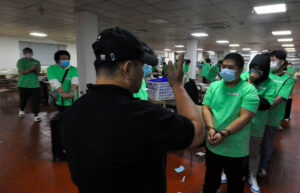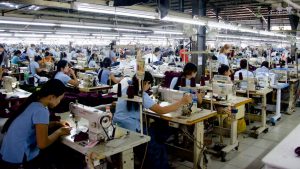By Kyle Aristophere T. Atienza, Reporterand Chloe Mari A. Hufana
SCAMMERS linked to Philippine Offshore Gaming Operators (POGO) have exploited regulatory failure to implement a 2022 law that mandated the registration of Subscriber Identity Module (SIM) cards, a senator said on Sunday.
“The National Telecommunications Commission (NTC) should do its job of ensuring effective implementation of the SIM registration law,” Senator Sherwin T. Gatchalian said in a statement after a number of SIM cards used for fraud were found in recent raids of illegal POGO sites.
“The goal of this legislation is to provide accountability for those using SIM cards and to support law enforcement in tracking perpetrators of crimes committed through phones. Because the NTC has apparently forgotten its responsibility, scammers in the POGO industry continue to use SIM cards unabatedly,” he added.
The NTC did not immediately reply to an e-mail seeking comment.
Mr. Gatchalian was referring to raids conducted against Smartweb Technology Corp. in Pasay City, Zun Yuan Technology in Bamban, Tarlac and Lucky South 99 in Pampanga.
Authorities seized SIM cards with false identities and phones and scripts for scamming during the raid of Zun Yuan’s site in March, Mr. Gatchalian said, adding that these were “used in undertaking love, cryptocurrency and other investment scams.”
The raid of Lucky South’s site earlier this month also yielded phone devices, he said.
But since the enactment of the SIM Card Registration bill in October 2022, fraudulent activities have risen significantly, said Mr. Gatchalian, who co-authored the measure.
“SIM registration is an important tool in combating online crimes that make use of a phone. The NTC should stop sleeping on its job so we can realize this goal,” he said.
At the weekend, the Presidential Anti-Crime Commission (PAOCC) said it was keeping an eye on 58 banned POGOs.
Its spokesman Winston John R. Casio told reporters some of those based in Pampanga, Cavite, Laguna, Palawan and Cebu might still be operating based on social media monitoring.
The agency is struggling with its lack of manpower, with only 49 agents, he said. There are 43 legal POGOs in the Philippines, according to PAOCC.
Meanwhile, American and British executives said POGO raids would not affect the appeal of the Philippines to investors.
“Most seemed to be surprised at the scale and possible Chinese influence, but most believe the Philippine government will be managing it properly,” American Chamber of Commerce of the Philippines, Inc. Executive Director Ebb Hinchliffe told BusinessWorld in a Viber message.
“Most foreigners wouldn’t have a clue what a POGO is, let alone the issues surrounding them,” he added.
British Chamber of Commerce of the Philippines Executive Director and Trustee Christopher James Nelson said illegal POGOs are a specific crime that British investors do not pay attention to.
Foreign investors are focusing more on the Philippines’ economy, the ease of doing business and key legislation, he added.
He said most foreign investors are more interested in the direction of interest rates and the peso. “What is going to happen with interest rates? Linked to that is where is the peso [going]?” he said by telephone.
Mr. Nelson said the Philippines remains attractive to foreign investors because of its skilled workforce.
A POGO ban is unlikely to dissuade foreign investors, he added.
American Chamber of Commerce adviser Katherine Stuntz said the government of President Ferdinand R. Marcos, Jr. should continue to address the issue of illegal POGOs. “It’s important to consider the broader economic context and other factors shaping investment decisions,” she said in a Viber message.
Economists have said POGOs complicate Philippine efforts against money laundering and may hinder its ambition to become an investment hub.
The country has been on the Financial Action Task Force’s (FATF) gray list of countries under heightened monitoring for dirty money since 2021, partly because of its loosely regulated gaming sector.
Legislators under the past administration passed a law legalizing POGOs by taxing them amid concerns about the social costs of gambling.
The Chinese Embassy in Manila last week issued a statement urging the Philippine government to ban POGOs.
It said the embassy has implicated about 3,000 Chinese nationals in POGO-related crimes since 2019.
Last year, it helped the Philippines in closing five POGO hubs and repatriating about 1,000 Chinese citizens.
“We ppeal to he Philippines to ban POGOs at an early date so as to root out this social ill,” it said in a statement on Friday. “We firmly oppose any baseless ccusation and smearing against China in connection with POGOs.”





